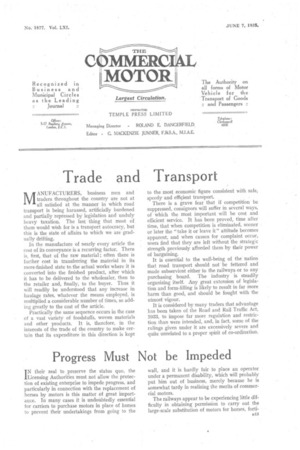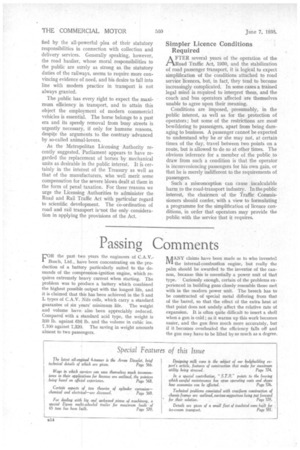Progress Must Not be Impeded
Page 27

Page 28

If you've noticed an error in this article please click here to report it so we can fix it.
IN their zeal to preserve the status quo, the Licensing Authorities must not allow the protection of existing enterprise to impede progress, and particularly in connection with the replacement of horses by motors is this matter of great importance. In many cases it is undoubtedly essential for carriers to purchase motors in place of horses to prevent their undertakings from going to the wall, and it is hardly fair to place an operator under a permanent disability, which will probably put him out of business, merely because he is somewhat tardy in realizing the merits of commercial motors.
The railways appear to be experiencing little difficulty in obtaining permission to carry out the large-scale substitution of motors for horses, fortiB13 fled by the all-powerful •plea of their statutory responsibilities in connection with collection and delivery services. Generally speaking, however, the road haulier, whose moral responsibilities to the public are surely as strong as the statutory duties of the railways, seems to require more con-. vincing evidence of need, and his desire to fall into line with modern practice in transport is not always granted.
The public has every right to expect the maximum efficiency in transport, and to attain this object the employment of modern commercial vehicles is essential. The horse belongs to a past era and its speedy removal from busy streets is urgently necessary, if only for humane reasons, despite the arguments to the contrary advanced by so-called animal-lovers.
As the Metropolitan Licensing Authority recently suggested, Parliament appears to have regarded the replacement of horses by mechanical units as desirable in the public interest. It is certainly in the interest of the Treasury as well as that of the manufacturers, who well merit some compensation for the severe blows dealt at them in the form of penal taxation. For these reasons we urge the Licensing Authorities to administer the Road and Rail Traffic Act with particular regard to scientific development. The co-ordination of road and rail transport is'not the only consideration in applying the provisions of the Act.
Simpler Licence Conditions Required
AFTER several years of the operation of the ..Road Traffic Act, 1930, and the stabilization of road passenger transport; it is logical to expect simplification of the conditions attached to road service licences, but, in fact, they tend to become increasingly complicated. In some cases a trained legal mind is required to interpret them, and the coach and bus operators affected are themselves unable to agree upon their meaning.
Conditions are imposed, presumably, in the public interest, as well as for the protection of operators; but some of the restrictions are most bewildering to passengers, apart from being damaging to business. A passenger cannot be expected to understand why he or she may not, at certain times of the day, travel between two points on a route, but is allowed to do so at other times. The obvious inference for a member of the public to draw from such a condition is that the operator is inconveniencing passengers for his own gain, or that he is merely indifferent to the requirements of passengers.
Such a misconception can cause incalculable harm to the road-transport industry. In the public interest, the chairmen of the Traffic Commissioners should confer, with a view to formulating a programme for the simplification of licence conditions, in order that operators may provide the public with the service that it requires.




























































































